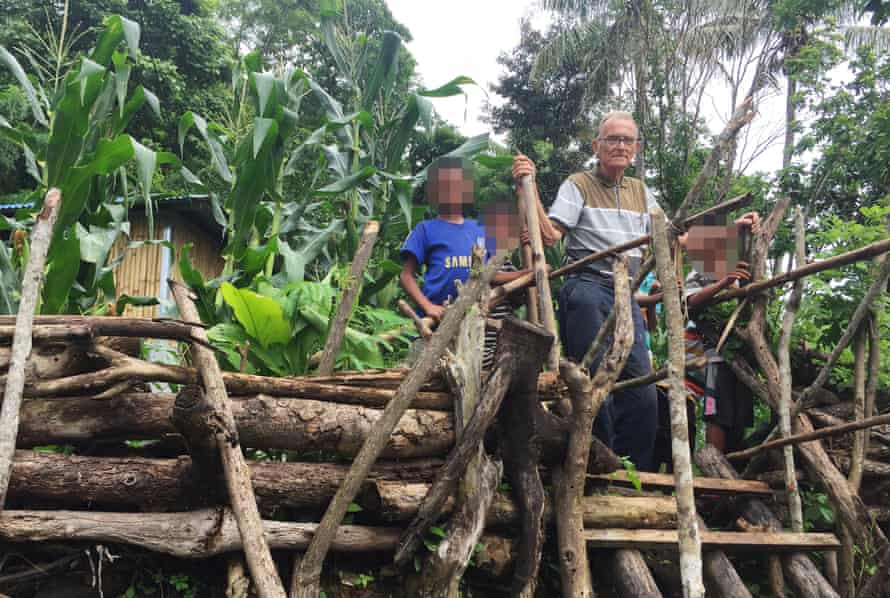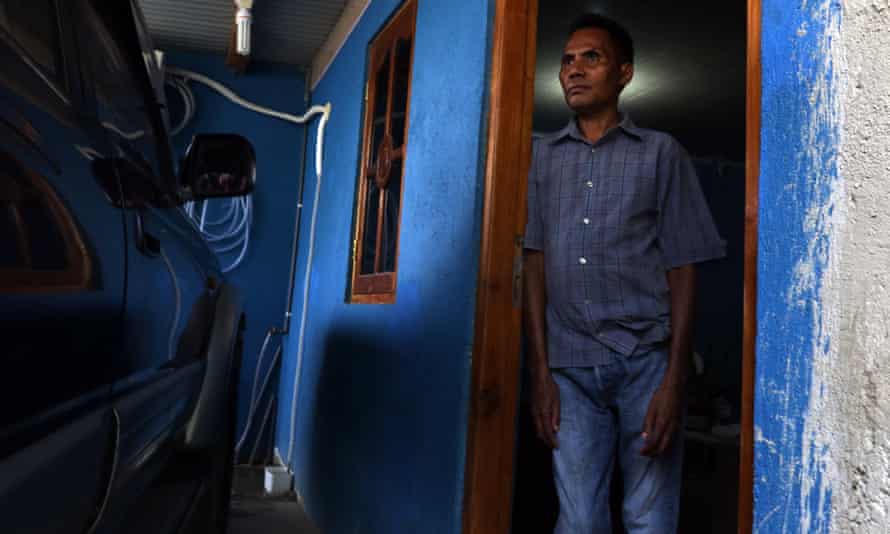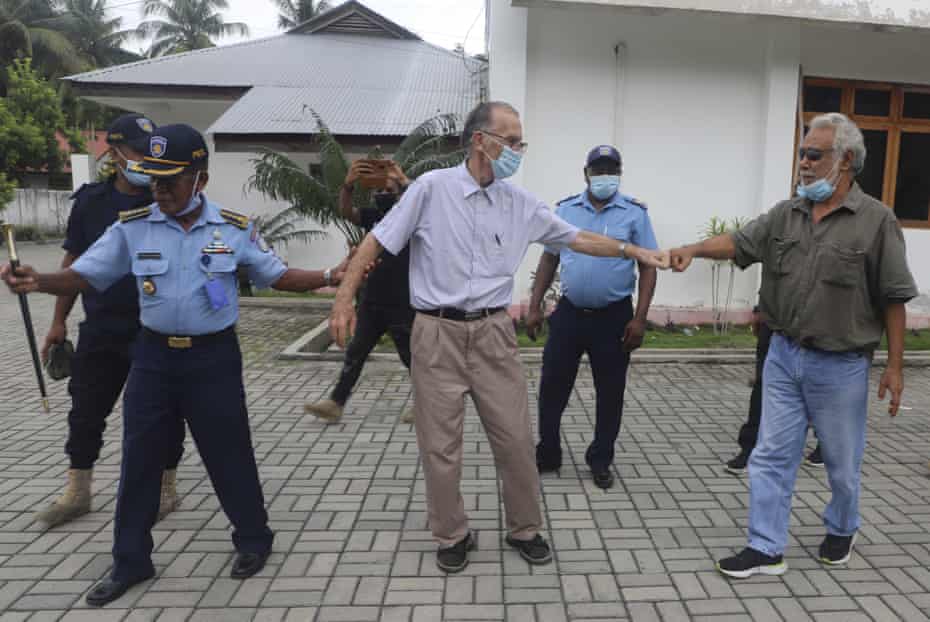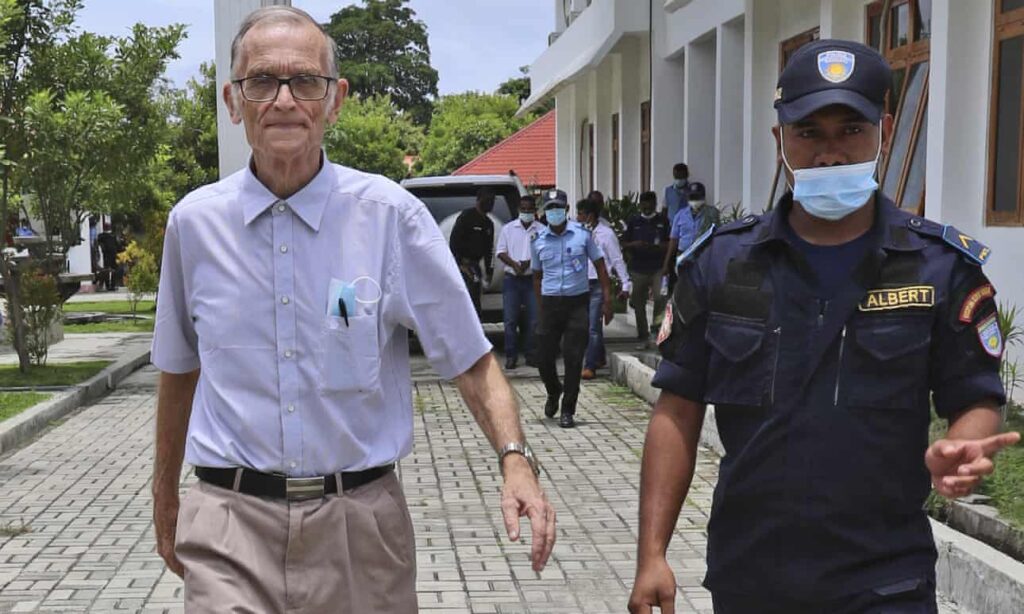(TIMOR-LESTE)
The Guardian [London, England]
May 22, 2021
By Zevonia Vieira and Tjitske Lingsma
The trial of defrocked priest Richard Daschbach, charged with sexual abuse of 14 girls, is dividing the small, deeply Catholic country
Lita grew up in a poor family in a hamlet surrounded by the spectacular mountains of Oecusse in Timor-Leste. When she was 11 years old she went to live in Topu Honis shelter home, in the mountainous, forest-encircled village of Kutet.
The shelter was run by Richard Daschbach, a now-defrocked 84-year-old US priest who founded the facility in 1992.
Daschbach, born in Pittsburgh and a former member of the Society of the Divine Word, was a powerful man. He was regarded as an expert in local language and many residents were convinced he had magical powers. Over the years the shelter, which had the support of international donors, took care of more than 600 orphans, poor children, vulnerable adults and abused women.
Lita says that in the evenings, as they gathered for prayers, Daschbach would take a girl on his lap.
“She was the one who would go to spend the night with him in his room and on his bed,” Lita says in an interview with Neon Metin. “In the following night, there would be another girl. The priest himself would say, ‘Tonight, you sleep with me.’”
Lita says he also used a list of the names of the children, taped to the door of his room, to indicate which girl should spend the night with him.

When Daschbach took her into his room, she says, he would lock the door, close the windows, then rape her.
“Because we were so young, we couldn’t say anything, because he looked after us very well, just like we were his own children,” Lita says. “Our parents could not afford anything. Our parents didn’t give us food, clothes and money. He looked after us. So, when he was abusing us sexually, we stayed quiet.”
‘I don’t want this to happen to my sisters’
Lita is now a young woman. She is smart and energetic, with big brown eyes and a quick laugh. As she speaks about the “bitterness and shame” of what she alleges happened to her as a child, she begins to cry.
Lita’s journey up until this point has been difficult, painful and exhausting. For her safety, her identity and location have to be kept confidential. But she feels compelled to speak out.
“I don’t want this to happen to my little sisters, or to my little sisters all over East Timor,” she says.
The alleged sexual abuse was a secret until in February 2018, when a complaint was sent to Daschbach’s superiors. Immediately the Society of the Divine Word and the Vatican’s Congregation for the Doctrine of the Faith launched an investigation. According to the report prepared by the society, which has been seen by the Guardian, during a phone conference on 5 March 2018, Daschbach admitted the sexual abuse to his superiors, saying: “This is 100% true.”
The Vatican defrocked Daschbach on 6 November 2018. He was also dismissed from his congregation. On 30 November hed signed and accepted the decrees dismissing him as a priest and as a member of the Society of the Divine Word.

However, the church didn’t disclose the sexual abuse to the public, and Daschbach continued to live freely in Oecusse.
In February 2019 the case was revealed by a local news outlet, Tempo Timor.
Daschbach was arrested in April 2019 and has been charged with 14 counts of sexual abuse against children under 14 years of age, as well as one count each of child exploitation material and domestic violence. His trial is due to resume on Monday.
This is the first time accusations of child sexual abuse against a priest have been made public in Timor-Leste, a deeply Catholic country.
When Daschbach’s trial finally started in February this year, hearings were immediately postponed, not once but twice – the second time due to limitations on travel due to a growing number of Covid-19 cases.
During Easter Timor-Leste also experienced its worst natural disaster in its history: torrential rains caused floods and landslides on the steep tropical mountains. They killed 41 people, and houses, buildings, schools and infrastructure were swept away.
“I am so stressed because of the delay of the trial,” Lita tells the Guardian over the phone. “I want the trial to continue immediately, but the Covid-19 situation and the recent floods make me even more afraid.”
Daschbach has six lawyers in his defence team, though they have refused to disclose who is paying their fees. The trial, which is being heard by three judges, is taking place behind closed doors, with media not allowed inside.
Daschbach’s lead counsel, Pedro Aparicio, says he can’t publicly say whether his client maintains his innocence or is pleading guilty because this is confidential information shared during closed legal proceedings.

The Associated Press cited documents it had seen – which have not been seen by the Guardian – which indicate that they will argue he is the victim of a conspiracy.
In January the former priest told local reporters his message to the children in the orphanage was: “Be patient. We won’t meet again because I will be detained for life, but I will still remember you and you have to be happy there.”
Silence and threats
The Catholic church is very powerful and highly respected in Timor-Leste, where 98% of the population of 1.3 million people identify as Catholic. During the brutal occupation by Indonesia from 1975 to 1999, when as many as 183,000 people are believed to have died from hunger, disease and killings, the church was one of the only institutions that offered protection. Many Timorese owe their lives to the clergy.
“You don’t want to discredit the church, otherwise you go to hell,” says José Trindade, a government official who advises the presidency of the council of ministers on sociocultural matters.
“People will say they don’t believe you, and that you made it up,” Trindade says, adding that alleged victims also fear death threats.
He has a lot of respect for those who have come forward: “They are very brave.”
Lita says when the case came to light, girls who had lived at the shelter and were alleged to have been abused by Daschbach were threatened by boys who had lived at Topu Honis with them.
“They threatened to beat us up,” Lita told Neon Metin. “That’s why some of the girls do not speak out, because they are afraid of being beaten up by men.”

The case has divided the country. When the trial began, a large group of people came to the court to show their support for Daschbach, including Xanana Gusmão – former president, prime minister, resistance commander and national hero. Gusmão was photographed fist-bumping Daschbach in the street outside the court. He was also filmed feeding the accused cake in celebration of the former priest’s 84th birthday.
The Catholic church has offered a mixed response to the alleged victims. In September its Justice and Peace Commission, which falls under the Metropolitan archdiocese and was established during the Indonesian occupation to advocate for justice and human rights, wrote a report which named them, making them vulnerable to intimidation. The report defended Daschbach and accused the prosecution, police, lawyers, healthcare workers, the child rights commissioner and nongovernmental organisations of “organised crime”, “human trafficking”, “exploitation of children” and being a “justice mafia” for working on the case.
In October Archbishop Virgílio do Carmo da Silva sacked the commission’s director of the Justice and Peace Commission and apologised to the alleged “victims of Topu Honis” for the actions of the commission. He said the church would continue to “collaborate with all NGOs and another civil society organization to support the victims and trust in the judicial system to do their job”.
‘I try to put myself in their shoes’
But support for those who say they were abused is growing. Lucitánia Cris heard about the case on the national news and social media last year.
“I was very shocked,” says the 19-year old law student and president of Timor-Leste Youth for Peace. “At first I could not believe it.
“How could he, being a priest, do this? He is a big and well-known figure in Oecusse. He helped so many families and children and also supported us during the independence war.”
Cris went to the Santo Antonio junior high school in Oecusse, which the Topu Honis children attended. She saw Daschbach sometimes in church and when he picked up the shelter children from school. She says that while people in Oecusse are reluctant to talk about the case, she believes the alleged victims.
“They are not afraid to tell the truth, no matter what the consequences are … I try to put myself in their shoes. How would I feel if I had to live with so much pain. Imagine you have to live with the memories of rape. This stays with you for the rest of your life. It’s so difficult.”
She welcomes the public debate arising from this case, breaking the silence in Timor-Leste about church sexual abuse. “If we don’t talk about it, it will continue for generations to come,” Cris says.
Trindade believes there may be other cases of sexual abuse by the clergy in Timor-Leste and victims may be watching to see how the case against Daschbach develops, before they decide to come forward.
“The church is shaking a bit now, because they are afraid that people will go after them,” he says. “It is a ticking time bomb that sooner or later will go off, with a big bang. It is a matter of time.”
